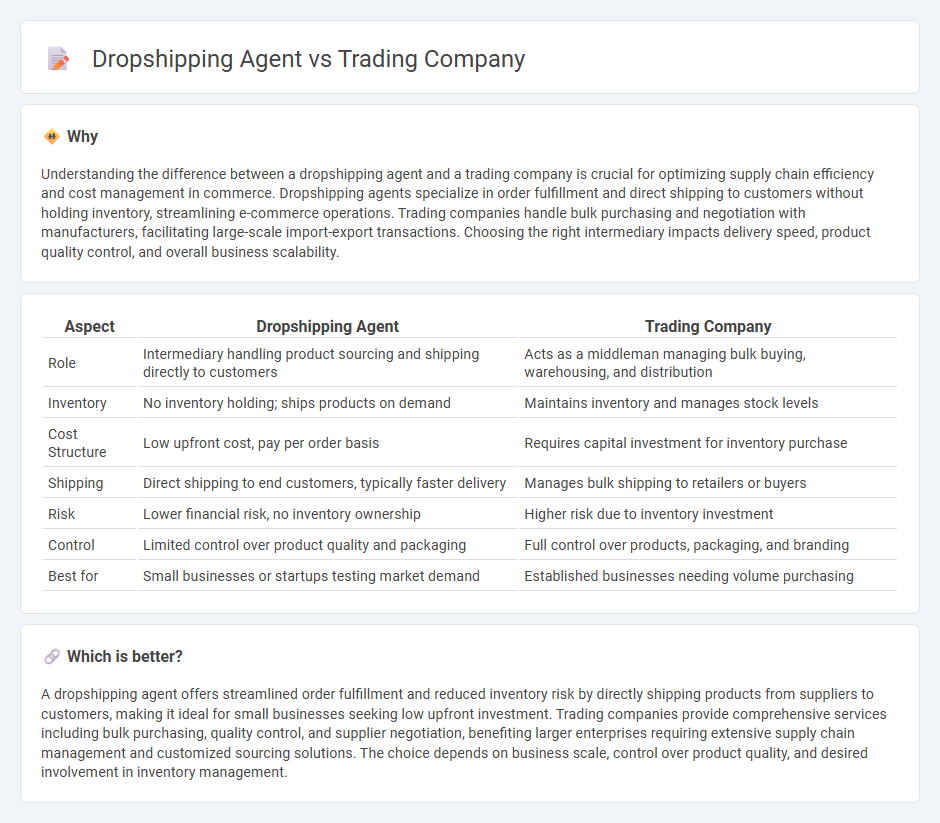
Dropshipping agents specialize in managing product sourcing, order fulfillment, and direct shipping to customers without holding inventory, optimizing efficiency for e-commerce businesses. Trading companies handle the procurement and distribution of goods in bulk, often involving complex supply chain management and international trade negotiations. Explore the key differences to determine which option best suits your commerce needs.
Why it is important
Understanding the difference between a dropshipping agent and a trading company is crucial for optimizing supply chain efficiency and cost management in commerce. Dropshipping agents specialize in order fulfillment and direct shipping to customers without holding inventory, streamlining e-commerce operations. Trading companies handle bulk purchasing and negotiation with manufacturers, facilitating large-scale import-export transactions. Choosing the right intermediary impacts delivery speed, product quality control, and overall business scalability.
Comparison Table
| Aspect | Dropshipping Agent | Trading Company |
|---|---|---|
| Role | Intermediary handling product sourcing and shipping directly to customers | Acts as a middleman managing bulk buying, warehousing, and distribution |
| Inventory | No inventory holding; ships products on demand | Maintains inventory and manages stock levels |
| Cost Structure | Low upfront cost, pay per order basis | Requires capital investment for inventory purchase |
| Shipping | Direct shipping to end customers, typically faster delivery | Manages bulk shipping to retailers or buyers |
| Risk | Lower financial risk, no inventory ownership | Higher risk due to inventory investment |
| Control | Limited control over product quality and packaging | Full control over products, packaging, and branding |
| Best for | Small businesses or startups testing market demand | Established businesses needing volume purchasing |
Which is better?
A dropshipping agent offers streamlined order fulfillment and reduced inventory risk by directly shipping products from suppliers to customers, making it ideal for small businesses seeking low upfront investment. Trading companies provide comprehensive services including bulk purchasing, quality control, and supplier negotiation, benefiting larger enterprises requiring extensive supply chain management and customized sourcing solutions. The choice depends on business scale, control over product quality, and desired involvement in inventory management.
Connection
A dropshipping agent serves as an intermediary between e-commerce sellers and suppliers, streamlining order fulfillment without the need for inventory management. Trading companies facilitate global commerce by sourcing products, managing logistics, and negotiating contracts, often collaborating with dropshipping agents to expand market reach and supplier networks. Their connection lies in optimizing supply chain efficiency and enabling seamless product distribution in international markets.
Key Terms
Inventory Management
Trading companies typically manage large inventories, purchasing products in bulk and storing them until distribution, which ensures faster order fulfillment and greater control over stock levels. Dropshipping agents do not hold inventory; instead, they coordinate shipments directly from suppliers to customers, reducing overhead but risking delays or stockouts. Explore the differences in inventory management strategies to determine which approach best suits your business needs.
Order Fulfillment
Trading companies manage inventory and handle bulk purchases to fulfill orders efficiently, often offering better control over stock levels and quality assurance. Dropshipping agents act as intermediaries between sellers and suppliers, processing individual orders without holding inventory, which reduces upfront costs but may increase fulfillment times. Explore further to understand which model aligns best with your business needs in order fulfillment.
Profit Margin
Trading companies typically handle bulk purchases and maintain inventory, allowing for higher profit margins due to volume discounts and control over pricing. Dropshipping agents act as intermediaries without holding stock, resulting in lower upfront costs but slimmer profit margins owing to added fees and less price control. Explore detailed comparisons to determine which model maximizes profitability for your business.
Source and External Links
What is a Trading Company? // Trading Companies vs Wholesalers ... - A trading company is a commercial business that buys and sells goods, specializing often in international import/export, acting as an intermediary between manufacturers and buyers worldwide, and handling supply chain stages like processing, distribution, and logistics.
List of trading companies - Wikipedia - Trading companies operate by connecting buyers and sellers, sometimes without owning goods, and include notable firms worldwide such as Mitsui, Mitsubishi Corporation, Jardine Matheson, and Glencore, with roles in various industries including consumer goods and commodities.
Trading | Charles Schwab - Charles Schwab offers online trading tools and services for investors, providing platforms for trading stocks, ETFs, and futures with industry-leading technology and support features designed to empower traders.
 dowidth.com
dowidth.com